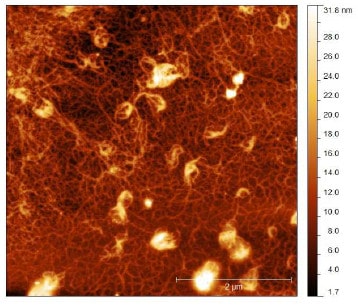The team describes the collagen-based functionalization of substrates for enhanced cellular response
Collagens are among the most widely present and important proteins composing the human total body, providing strength and structural stability to various tissues, from skin to bone. In this paper, we report an innovative approach to bioactivate planar surfaces with oriented collagen molecules to promote cells proliferation and alignment. The Langmuir-Blodgett technique was used to form a stable collagen film at the air-water interface and the Langmuir-Schaefer deposition was adopted to transfer it to the support surface. The deposition process was monitored by estimating the mass of the protein layers after each deposition step. Collagen films were then structurally characterized by atomic force, scanning electron and fluorescent microscopies. Finally, collagen films were functionally tested in vitro. To this aim, 3T3 cells were seeded onto the silicon supports either modified or not (control) by collagen film deposition. Cells adhesion and proliferation on collagen films were found to be greater than those on control both after 1 (p<0.05) and 7 days culture. Moreover, the functionalization of the substrate surface triggered a parallel orientation of cells when cultured on it. In conclusion, these data demonstrated that the Langmuir-Schaefer technique can be successfully used for the deposition of oriented collagen films for tissue engineering applications.
L. Pastorino, E. Dellacasa, S. Scaglione, M. Giulianelli, F. Sbrana, M. Vassalli, C. Ruggiero (2014): “Oriented collagen nanocoatings for tissue engineering”. Colloids and Surfaces B: Biointerfaces
All Resources
Never stop learning!
Check publications from the team, protocols, and useful information to boost your research and get into organ on chip technology!


